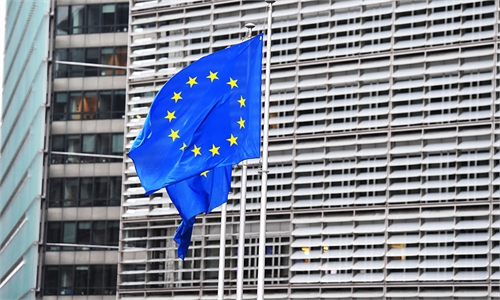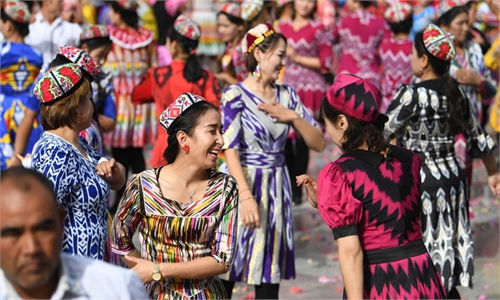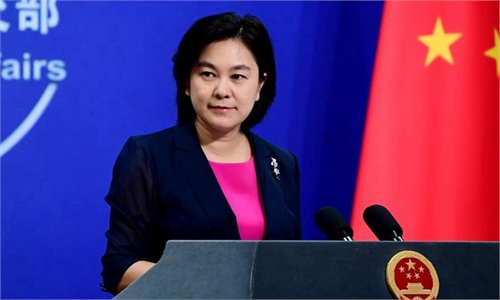EU 'insane' to extend conflict to economic field: observers
US 'hypocritical' to form 'human right alliance' against China
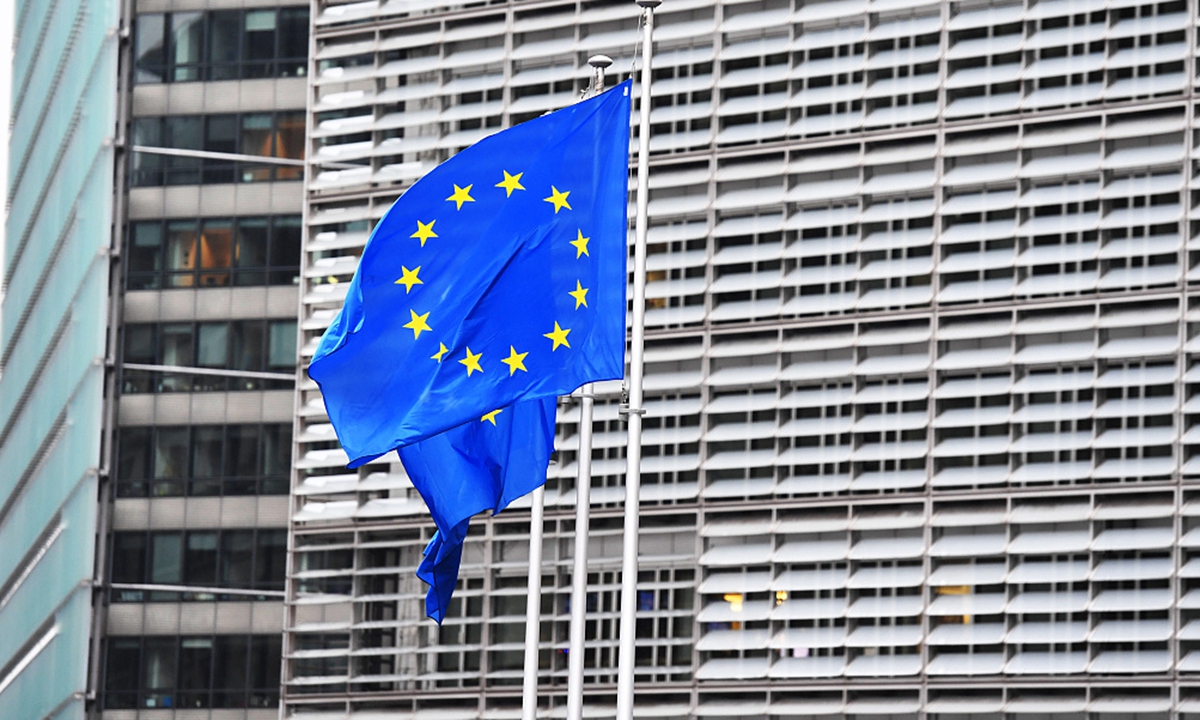
Photo:VCG
The tit-for-tat sanctions between China and the EU intensified on Tuesday as more Western countries, including the US, Canada and the UK, joined the EU in slapping sanctions on China, and China summoned the EU and UK ambassadors to China to protest their sanctions.Yet observers noted that whether the current conflict between Beijing and Brussels will drag the two sides into all-out competition depends on whether the bloc is willing to extend it to trade, a highlight of which being if the bilateral investment treaty will be affected.
If other areas of bilateral cooperation are affected, the bloc will suffer more, warned experts.
Although the sanctions against China over the country's policies in Northwest China's Xinjiang Uygur Autonomous Region were triggered by the EU, observers said that the US has played the most important role. The US attempts to get the alliance to encircle China on the pretext of human rights can hardly be sustained, even though it has succeeded so far, as the foundation of China-EU ties is the economic cooperation, they said.
They urged rational forces in the EU to seriously deal with such a possibility, and try to prevent certain people or political power from leading China-EU ties to the wrong direction.
Chinese Vice Foreign Minister Qin Gang on Monday summoned EU's envoy to China Nicolas Chapuis to protest and denounce the EU's latest sanctions on China over so-called human rights issues in Xinjiang.
On behalf of the Chinese government, Qin also declared China's countermeasures which include sanctioning 10 individuals and four entities that have spread rumors and lies about Xinjiang.
The EU's restrictive measures targeted four Chinese nationals and one entity.
"Our countermeasures may have come as a surprise to Brussels, as they probably expect equal sanctions, yet we anted up our punitive measures," Cui Hongjian, director of the Department of European Studies at the China Institute of International Studies, told the Global Times on Tuesday.
"This sends a clear signal to the bloc where our bottom line is, and warns the EU of severe consequences if it is plotting further punitive measures," Cui remarked.
Cui said that if sanity remains in the EU, it should refrain from escalating the conflict, and avoid extending the human rights scuffle to the trade cooperation between the two sides.
Since Beijing and Brussels slapped sanctions on each other, there's speculation whether the epic bilateral investment treaty (BIT) between the two sides, negotiations of which was completed at the end of last year, will be shadowed by the latest fight. Some in the bloc had tried to hijack the signing, citing the so-called forced labor problem in Xinjiang as an excuse.
Hua Chunying, spokesperson of China's Foreign Ministry, said the EU cannot expect to cooperate with China on one hand, while slapping sanctions on the other. Such deeds harm China's interest and won't work, said Hua, urging the bloc to reflect and stop confrontation.
Soon after Beijing's sanctions were announced, the Socialists and Democrats - the second-largest grouping of lawmakers in the European Parliament - said they would not engage in any talks on the BIT until the measures are lifted, the CNN reported on Tuesday.
The EU needs the deal much more than China does, it needs China's 1.4 billion population market to help save the continent from COVID-19 and help its economic transformation, said Wang Yiwei, professor at the School of International Relations at Renmin University of China.
The EU's punitive measures, which are mostly "symbolic," shows it does not want to increase tensions with China, but to give an answer to the anti-China voices in the bloc and the US, according to Wang.
Yet he warned that China's timely, tough response sends a signal that if the EU gives in to China hawks, it will meet with a fiercer response from Beijing, which eventually would backfire.
Hungary's foreign minister, Peter Szijjarto, called the EU sanctions "harmful" and "pointless." "If the cooperation [with China] could be put on the ground of rationality, the EU could seriously benefit from it," Szijjarto said.
China surpassed the US as the EU's largest trading partner in 2020.
A hypocritical 'human rights alliance'
Joining the EU's club, the US, UK and Canada also imposed sanctions. US Secretary of State Antony Blinken said the sanctions demonstrated "our ongoing commitment to working multilaterally to advance respect for human rights."
The Chinese Embassy in Canada strongly opposed and condemned Canada's behavior. When Qin Gang summoned Caroline Wilson, UK ambassador to China, on Tuesday, he protested the UK's unilateral sanctions on China on the Xinjiang affairs, and said China will make a necessary, justified response to the UK's action.
Lü Xiang, a research fellow on US studies at the Chinese Academy of Social Sciences, believes this is Washington's attempt to form a so-called human rights alliance targeting Beijing.
Yet more countries extended their support to China. The Western world does not have a dominant say on human rights globally, Lü said, although their voices were amplified by their relatively advanced information capacity.
When meeting with Russian Foreign Minister Sergey Lavrov in Guilin, a popular tourist city in South China's Guangxi Zhuang Autonomous Region on Tuesday, Chinese State Councilor and Foreign Minister Wang Yi said that Western countries should know that long gone are the days when they can throw mud at China merely by lying.
Lü called the Western countries' move a perfect example of "ostrich policy." "Instead of looking directly at their own ugly human rights record, they point their finger at China."
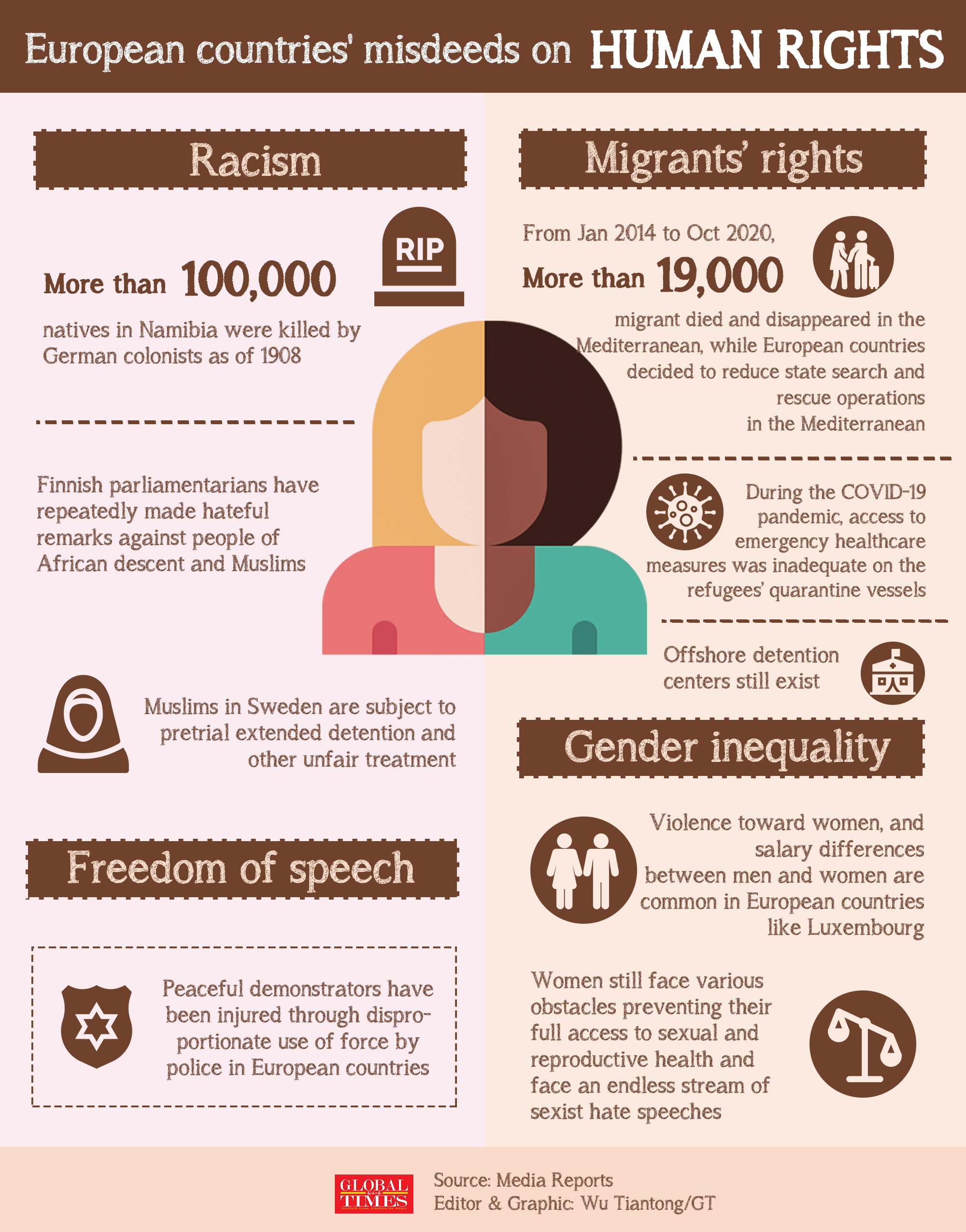
European countries' misdeeds on human rights. Graphic: Wu Tiantong
Germany slaughtered native Namibians under its colonial rule in the early 20th century and killed 6 million Jews in the Holocaust, including more than 1 million children, Hua said.
The US and its allies blatantly violated the Geneva Conventions and killed civilians in Afghanistan, committing serious war crimes and crimes against humanity, according to Hua.
History and evidence have proven they are not qualified to be "teachers on human rights," and China is not Libya, Syria or the China of 120 years ago. The time when a few cannons could break through China's gates has gone, and the time when some pseudo-scholars colluding with media can smear China without consequences has gone, Hua said.
Blinken arrived at Brussels on Monday to attend the NATO Ministerial, where he was scheduled to engage with European Union leaders, where the China topic is likely to be high on the agenda, observers predicted.
"As the US running over to persuade its allies to attack China, wielding the least useful and cheapest weapon of 'human rights,' many of those allies may be reluctant to openly joust with Beijing,'' said Lü. "I feel this is the doomsday of US hegemony."

